Conferences
One of the essential facets of the Ars Electronica Festival is the wide variety of formats it provides for a scholarly encounter with the cyberarts. In addition to the Goodbye Privacy Symposium the Festival schedule many interesting conferences: award-winning artists will discuss their work at the Prix Forums; Pixelspaces 2007 is being curated by the Ars Electronica Futurelab; conferences hosted by the Ludwig Boltzmann Institute Media.Art.Research as well as panel discussions organized by Radio FRO will round out the discourse.
Conferences
Closeness vs Dislocation – Contextualising Net-Based Art
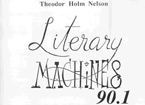
The field of media art was expanded in the 1990s to include the genre of network art. Exploratory and dynamically creative, critically probing and transcending the boundaries of both the medium and the very concept of art itself, it has nevertheless often been declared obsolete.
more
more
Conferences
Fundamental Rights in the Digital World - Lectures
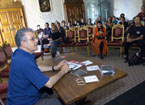
The Internet, cellphone and video are essential to how we communicate now. Massive numbers of people put themselves on display in weblogs and on sites like Flickr, MySpace and YouTube. A “second life” is being marketed under the buzzword Web 2.0.
more
more
Conferences
Pixelspaces 2007: Onfield
Pixelspaces 2007 is staging Onfield as a setting for a discussion of an emerging development: the strategies and methods of community informatics are being applied to location-based services. The Ars Electronica Futurelab is thus carrying on its practice begun in 2000 of intensively focusing on leading-edge trends in a series of symposia and exhibitions, and scrutinizing these developments from the perspective of an atelier-lab.
more
more
Conferences
Mobile Spaces - Paradoxes of the Public
“Paradoxes of the Public” is an international art competition being staged in conjunction with RUHR.2010. Entrants are invited to submit works for, among other settings, data spaces such as mobile technologies. Söke Dinkla and Bernd Wiemann will present the competition and discuss the new possibilities of communication as well as alternative spaces in which to experience mobile technologies.
more
more
Conferences
OVERTURES - environmental office. environmental information. environmental monitoring. environmental control.
Overtures, a series of projects launched in the year 2000, deals with a complex of issues having to do with water. From its very inception, this has been designed to entail close cooperation among artists, curators, technologists, scientists, economists and media experts.
more
more
Conferences
fair music
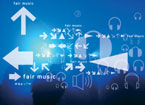
Start of the fair music initiative of mica –music austria and presentation of the winners of the fair music award
Music fans have a right to listen to the exact music they want to. Creative artists have a right to receive recognition and compensation for their work and ideas. Listeners assume the money they spend for music will benefit the artists of their choice. But can they really be assured that the artists receive their fair share of the proceeds, and that the artists are allowed to make their music in a free and creative atmosphere and under fair conditions?
more
Music fans have a right to listen to the exact music they want to. Creative artists have a right to receive recognition and compensation for their work and ideas. Listeners assume the money they spend for music will benefit the artists of their choice. But can they really be assured that the artists receive their fair share of the proceeds, and that the artists are allowed to make their music in a free and creative atmosphere and under fair conditions?
more
Conferences
UNESCO Lounge
The UNESCO Convention on the Protection and Promotion of the Diversity of Cultural Expressions came into force on March 18, 2007. Strengthening democracy, ensuring justice and protecting the diversity of cultural production from the incursions of purely market-driven economic mechanisms are a few of its declared objectives.
more
more
Conferences
Radio FRO Conference - Goodbye FM/AM farewell analogue TV
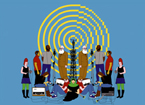
Preparations for both of the conference’s panels are being made at two "birds of a feather" sessions. The aim is to create a relaxed setting for exchange and dialogue
more
more
Conferences
Secure Online – Symposium
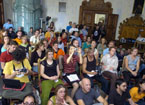
Speeches and discussions will provide a setting for a critical process of coming to terms with issues connected with the rights of minors, data protection and the protection of minors online, as well as to help eliminate prejudices and to ease fears.
more
more
Conferences
Featured Artist Speech
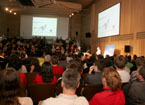
more
Conferences
ISEA
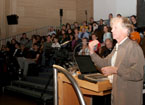
Update by Nina Czegledy, on the recent developments and plans for the Foundation ISEA-International by ISEA Board representative http://www.isea-web.org
more
more
Conferences
AUDIOWALK GUSEN TALK
with Prof. Aleida Assmann and christoph mayer chm.
more
more
Conferences
Fundamental Rights in the Digital World - Workshops
The Internet, cellphone and video are essential to how we communicate now. Massive numbers of people put themselves on display in weblogs and on sites like Flickr, MySpace and YouTube. A “second life” is being marketed under the buzzword Web 2.0.
more
Huge quantities of data are available—often made public by the subjects themselves, though mostly with hardly a clue about the potential consequences of having done so. In the digital world, is it even possible to enforce our fundamental rights to the protection of our personal information and our private sphere? What exactly does it mean to have a fundamental right to information? How is the private sphere changing in the transparent world of digital media?
Ars Electronica and the Fundamental Rights Section of the Austrian Judges Association are jointly organizing this interdisciplinary symposium. Following an introduction to the subject by international experts, the first afternoon session is intended to heighten judicial consciousness of the need for legal protection in certain areas. On the second day, attention will shift to society’s current conception of the private sphere in the novel context of terrorism and Web 2.0.more
Conferences
Goodbye Privacy Symposium
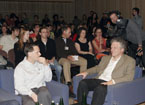
We publicize our view of the world and of ourselves in weblogs and at sites like Flickr, MySpace and YouTube. Many of the services that are being marketed under the banner of Web 2.0 are based on network linkup, exchange and the voluntary revelation of private information. With the emergence of this new “public life,” the value of that which is private has changed. Thus, there are indeed more and better forms of participation, but the staging of the private sphere before a mass public reduces the cultural status ascribed to it. At the same time, there's a bull market in detailed information about private individuals. The automatically analyzable data traces we leave behind give rise not only to new service industries but also to the architecture of surveillance and control. Figures, data and quantifiability have long since become conventional means of social selection and organization. Are we well on the way to a transparent society? Or is this hymn in praise of the new openness precisely what is paving the way for the abuse of power behind the scenes?This year’s Ars Electronica symposium will scrutinize this updated private sphere under the new conditions of terrorism and Web 2.0.
Ina Zwerger, Armin Medosch
more
Ina Zwerger, Armin Medosch
more
Conferences
Prix Forum
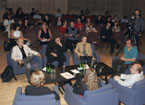
The Prix Ars Electronica prizewinners and their work occupy the center of attention at the Prix Forums. They’ll be joined in these discussions by jury members and prominent experts from around the world.
more
more
Conferences
Symposium - talks on the neoanalog
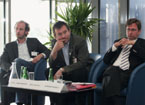
Listen to and exchange ideas with the players involved in acar2. Understand leading design profs' and students' positions and products in their quest for a refreshing dimension of the digital: the neoanalog. Where and why did such a unique collaboration come about, what are its results, and what what are its aims for the future?
more
more